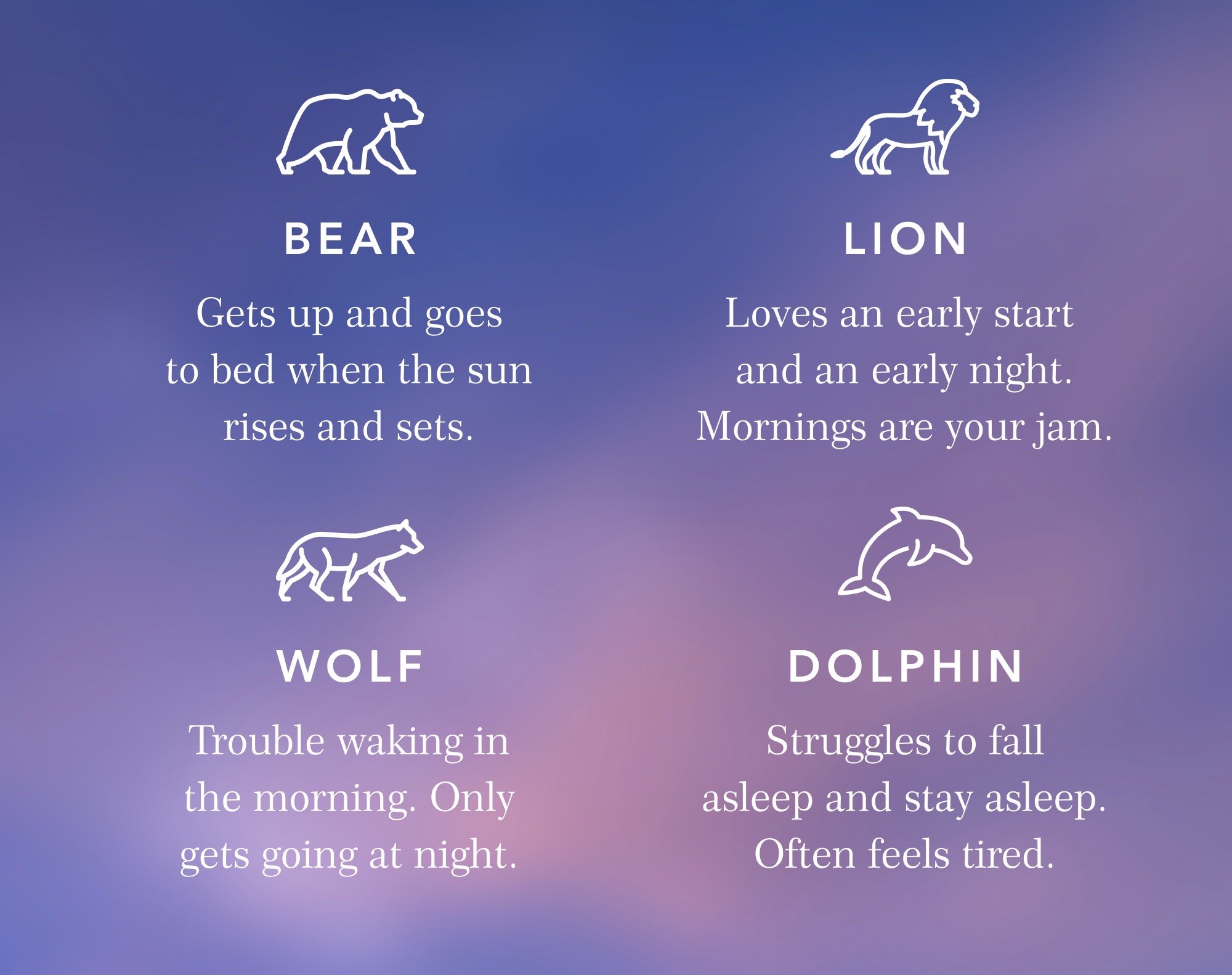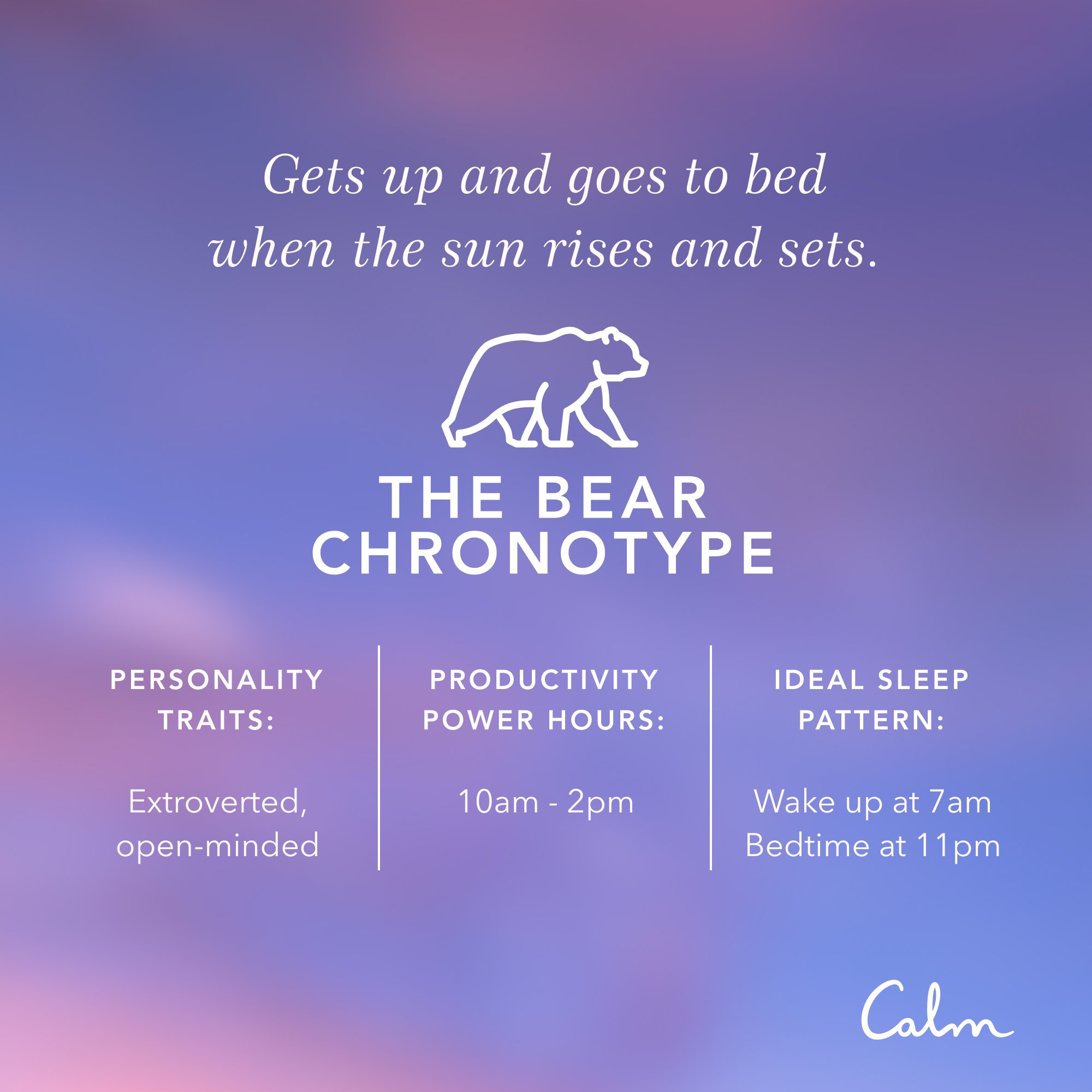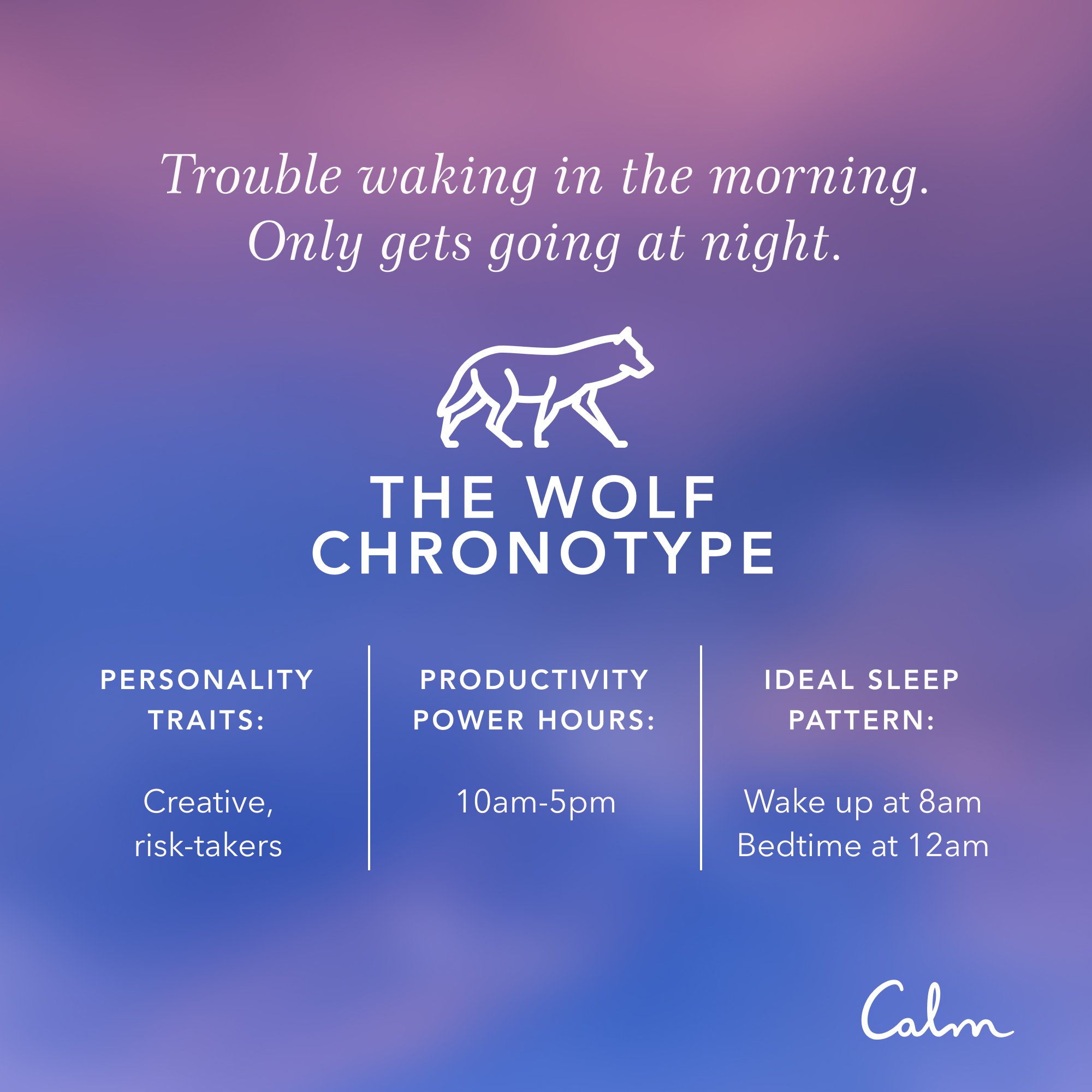What your chronotype says about your sleep patterns, productivity & personality
Each of us has a unique biological rhythm that affects not only how and when we sleep, but also our creativity, productivity, and even our personality. Discover your chronotype and how to harness it to build a happier, healthier life.
Are you someone who wakes up bright-eyed and energized in the morning, ready to take on the day? Or are you more of a hit-the-snooze-button-at-least-five-times type of person?
Do you see the evenings as a chance to slow down and unwind before an early bedtime? Or are the evenings when you feel most creative and productive?
More than just preferences, these tendencies are expressions of our body’s biological rhythms. We’re all operating on a unique biological clock, which regulates a wide range of our activities and even our personalities. One part of this expression is rooted in our chronotype.
What is a Chronotype?
A chronotype is your natural disposition to wake up and go to sleep at certain times. It’s closely related to your body’s circadian rhythm, which controls your sleep-wake cycle and how much melatonin you produce. But while circadian rhythms are primarily influenced by light exposure, your sleep chronotype isn’t influenced by any outside force. It comes down to your genetics. More specifically, your chronotype is determined by the length of your PER3 gene.
🔹 Fun fact: It’s theorized that the variations in our chronotypes may have been a tool for survival that developed in the time of hunter-gatherers. By sleeping at different times, there would always be someone awake to look out for danger.
Why Do Chronotypes Matter?
Because it’s inherent to you, it’s important to learn to work with your chronotype rather than against it. With this greater understanding, you’ll be better able to figure out your ideal sleep schedule and get the best rest possible.
Related: What’s Your Sleep Language?
But more than just rest, your chronotype affects all aspects of your daily life. Things like:
Your appetite
Your body temperature
Your ideal window for productivity
Your personality type
So while your chronotype can give you valuable insights into your mind and body, it can also empower you to rethink the way you schedule your days. Instead of writing yourself off as “lazy” or “unmotivated”, you can work with your natural rhythms and energy levels to accomplish important tasks in a way that feels balanced and supportive.
“Instead of writing yourself off as “lazy” or “unmotivated”, you can work with your chronotype to accomplish tasks in a way that feels balanced and supportive.”
What are the 4 Chronotypes?
While generally grouped into three types (early birds, hummingbirds, night owls), Dr. Michael Brues, Clinical Psychologist & Sleep Medicine Expert, has expanded these chronotypes into four types based on his years of experience with clients. He also updated the categories to fellow mammals for our greater understanding of the archetypes. Here’s what you need to know about the four sleep chronotypes.
Bear Chronotype
The most common chronotype, driving 55% of people, is the bear. Bears like to adhere to a solar schedule, meaning they get up when the sun rises and go to bed when it sets. Because they are the majority, modern society has adopted bear time as the norm, and most people (no matter the chronotype) are living on this schedule when it comes to school, work, and socializing.
Schedule: Bears are all-day “hunters” which means they spend most of the day awake and then tend to sleep deeply at night. They are most alert and productive during the middle of the day, from late morning through early afternoon, making their productivity power hours from 10 am-2 pm.
Personality: Bears are go-with-the-flow types, social, and fun-loving. They are known for being extroverted, open-minded, and great team players.
Challenges: Bears are prone to inconsistency in their sleep routine, under-sleeping during the work week, leaving them with a “sleep debt”, and then sleeping extra on the weekends to try and “catch up”. These inconsistent sleep habits can put the bear’s circadian clock chronically out of sync, which is also called social jetlag (more below).
🔹 Tips for Bears: Schedule your important tasks earlier in the day to finish before your natural crash around mid-afternoon.
Lion Chronotype
Lions make up about 15% of people and love early mornings and early nights. Lions have a natural tendency for routine and moderation in their habits which positively impacts their overall health. Morning types with early bedtimes are shown to have a lower risk for cardiovascular disease and diabetes and may have lower risks for mental health disorders like depression. Plus, they may perform better in school.
Schedule: Lions are morning “hunters”, so they are generally good sleepers that wake up energized and ready to take on the day. The morning and early afternoon are their most productive times making their productivity power hours from 7 am-12 pm.
Personality: Lions are optimistic, practical, and natural leaders. They are goal-oriented and naturally disciplined, including with their sleep routines. Lions love to stick to a regular, early bedtime.
Challenges: Lions spend most of the early day with a lot of energy, which means they often feel exhausted by the afternoon, finding it hard to concentrate and get tasks done.
🔹 Tip for Lions: Take advantage of your natural energy burst and schedule high-priority tasks for before noon
Wolf Chronotype
Wolves, about 15% of the population, have a strong preference for the evening when they feel like they can really get going. A true “night owl”, Wolves find spikes of energy when everyone else is winding down for the day. Because of this, they often have trouble waking up in the morning, maybe hitting the snooze button on their alarm several times.
Schedule: Wolves are nighttime "hunters", feeling most productive in the evening. They don’t start feeling tired until midnight or so which makes their productivity power hours from 4 pm-6 pm.
Personality: Wolves are risk-takers who love seeking out new experiences. They can be impulsive and emotionally intense and also creative thinkers.
Challenges: Because of their strong preference for the evening, wolves tend to struggle to live in the (bear-driven) schedule of society. Many things start too early for them which makes them vulnerable to insufficient sleep and social jet lag which can have consequences for mental and physical health (see more below).
🔹 Tip for Wolves: Time your meals correctly to help you stay on a somewhat moderate schedule and try to get ahead of your deadlines so you can spend your evenings on creative projects.
Dolphin Chronotype
The least common chronotype at 10% of people, dolphins are “wired and tired” types. They are tired during the day and wired with restless, nervous energy at night. Dolphins struggle to fall asleep and stay asleep, tending to wake up often during the night.
Schedule: Dolphins are uni-hemispheric sleepers, which means they sleep with one half of their brain at a time, with the other half awake and active. Unlike other chronotypes, dolphins’ brain activity increases at night in the area of the brain that promotes alertness. Their blood pressure and cortisol levels also rise in the evening, which heightens activation in the body, then plummets in the morning (when the rest of the chronotypes are experiencing the elevations to help them wake up). But Dolphins do have a high productivity window with their productivity power hours from 3 pm-9 pm
Personality: Dolphins are highly intelligent, cautious, and detail-oriented. Perfectionism is a common Dolphin trait, as is anxiety.
Challenges: Dolphins are very sensitive to external factors like noise and light, which is one common reason they have a hard time staying asleep and are often diagnosed with insomnia.
🔹 Tip for Dolphins: You may feel tired on and off throughout the day so practice taking breaks often to reset and refresh.
Not Sure Your Type?
For some, your sleep chronotype may be crystal clear to you based on the outlines above. But if you’re left with some doubt, don’t stress. One of the best ways to get more clarity on your type is by tracking your sleep habits. Spend a week or so exploring your answers to these questions:
Do I feel better when I get up early or when I sleep in?
If you didn’t have to set an alarm, and could go to bed at any time, what time would I choose?
When do I feel like I get the most work done during the day?
What times do I feel most creative and productive?
Let these questions help you notice the natural rhythms of your body and then look back at the descriptions above to see where you fit in. If you want more guidance, you can also take this quiz made by Dr. Brues to help you find your sleep chronotype.
🔹 FYI: You can be in-between chronotypes. People with bear chronotypes are more likely to be part of a hybrid, sharing traits with lions, wolves, and even dolphins. Also, females tend to have an earlier chronotype than males.
Can I Change my Chronotype?
The short answer is no, you can’t change your chronotype on your own. But the long answer is that it will change over your lifetime. Because in addition to genetics, your age has an impact on your chronotype.
In general, most kids have early/morning chronotypes (lions and bears) causing them to wake up early and go to sleep early. But that usually changes to a later/evening one (wolf and sometimes dolphin) come adolescence. This means they often go to bed late and find it difficult to get up in the morning for school (leading to the myth that teenagers are lazy). After the age of 20, chronotypes start to shift back to the early/morning types, getting even earlier in older adulthood.
🔹 Reminder: If you find yourself in a transitional period where your body clock seems “off” and your sleep needs are changing, know that this is normal and should eventually settle into a new rhythm
What is Social Jetlag?
We know that we each have a biological rhythm that influences our sleep chronotype. But there are also the fixed social rhythms of life (primarily school and work start and end times) that may directly conflict with our natural sleep tendencies. When a person’s natural chronotype comes into conflict with the demands of their social schedule it can lead to chronic sleep loss which is called social jetlag.
People with later chronotypes tend to struggle with social jetlag if they need to wake up early for work or school when they naturally still want to sleep. Whereas people with early chronotypes can struggle with social jetlag if they have lots of social activities scheduled later in the evening when they naturally go to bed. In either case, it’s difficult to engage in activities that require concentration or creativity at your own chronotype’s “off-peak” hours.
🔹 (Not so) Fun Fact: Social jetlag has been linked to a greater risk for obesity, and the development of diabetes and depression.
Working with Your Chronotype
The good news is that knowing your chronotype can help you best adapt to, and support, the needs of your body. Starting to work with your body’s rhythms rather than against them, allows you to be happier, healthier, and more productive.
Related: The 5 Biggest Sleep Myths (& 5 Science-Backed Habits To Optimize Your Sleep)
Here are some tips to help you embrace the powers of your chronotype!
Adjust your sleep times (if you can)
Dr. Brues, the sleep doctor, has outlined the ideal sleep and wake times for each chronotype based on the number of sleep cycles each typically needs.
🔹Bears Wake up: 7 am, Sleep: 11 pm
🔹Lions Wake up: 5:30 am, Sleep: 9:30 pm
🔹 Wolves Wake up: 7:30 am, Sleep: 12 am
🔹Dolphins Wake up: 6:30 am, Sleep: 11:30 pm
Keep in mind that the quality of your sleep also affects how much sleep you need. If you’re in noisy or uncomfortable environments, you may not get the ideal amount of sleep (especially for dolphins). If these suggestions feel unattainable, go slowly. Ease yourself into the new times and notice how it feels as you adjust.
Of course, not everyone can match their sleep routine to their chronotype due to work and school obligations, so do the best you can and follow good sleep hygiene habits to help you reduce the effects of social jetlag wherever possible.
Follow a consistent sleep schedule
Once you’ve found a sleep plan that works for your chronotype and your schedule, stick to it! A consistent sleep schedule makes a huge difference in your sleep quality and as a result, your life. And with some time it will become second nature.
It can become tricky to balance your sleep goals with social events, work demands, and even a bed partner’s differing sleep schedule. So stay committed, but also cut yourself some slack if and when you get off schedule. Take care of yourself the next day and do your best to get back on track.
Prepare for better sleep
So many of us (but especially dolphins) get stuck in a cycle of worrying about not getting enough sleep at night and then having that worry keep us from getting to sleep. And on and on. So, it’s helpful to have a mindful routine at night to step out of this pattern. Some great options for your sleep routine could be:
🔹Take a warm bath or shower to allow yourself to let go of the day you had and start to relax into a more restful state. Put on some relaxing music or a soundscape to enhance the mood.
🔹Set a timer (5-30 min) and journal about your anxiety and worry, and ways you might address them. Get it all out. Once the timer goes off, close your journal and leave all of the worries there, ready to be picked up tomorrow if needed.
🔹Try a relaxing sleep meditation to ready your body and mind for sleep
🔹If bedtime stories are your thing (they aren’t just for kids) let yourself drift off to a sleep story narrated by some of your favorite artists
Eat at the right times (for you)
All of us need to avoid eating too close to bedtime so our bodies have time to properly digest and metabolize our food before sleep. And eating a healthy breakfast when we wake up can help jumpstart your body, giving you the energy you need for the day ahead.
But when it comes to the specific times of our meals, we may all have slightly different schedules based on our chronotypes. Eating at specific times can help to regulate your body based on its unique sleep rhythm.
Here are the suggested eating times for each chronotype.
🔹Bears
Breakfast: 7:30 am
Lunch: 12 pm
Dinner: 7:30 pm
🔹Lions
Breakfast: 6 am
Lunch: 12 pm
Dinner 6 pm
🔹Wolves
Breakfast: 8 am
Lunch: 1 pm
Dinner: 8 pm
🔹Dolphins
Breakfast: 7:30 am
Lunch: 12 pm
Dinner: 7:30 pm
Remember, these are simply suggestions. Play around with your meal times to see what feels best in your body and schedule.
Avoid caffeine in the afternoon
It probably doesn't come as a surprise that caffeine can ruin your sleep if you have it too close to bedtime. Dr. Brues recommends cutting off the caffeine at least 6 hours before your scheduled bedtime.
If that means cutting out your late afternoon pick-me-up, try one of these energizing alternatives:
🔹Go on a walk (outside if possible)
🔹Do a short meditation
🔹Drink a big glass of water
🔹Take a catnap
🔹Eat a healthy snack
🔹Try some gentle stretching
🔹Dance to your favorite song for 2 minutes
Get help if needed
These tips and tricks may help you start to work with your sleep rhythm, helping you get the sleep you deserve. But no chronotype is immune to sleep disturbances or sleep disorders. If you find yourself struggling to get deep rest even after adjusting to your chronotype schedule, please reach out to your doctor or a sleep expert to get the support you need. 💙
Mental health is hard. Getting support doesn't have to be. The Calm app puts the tools to feel better in your back pocket, with personalized content to manage stress and anxiety, get better sleep, and feel more present in your life. Calm your mind. Change the world.













